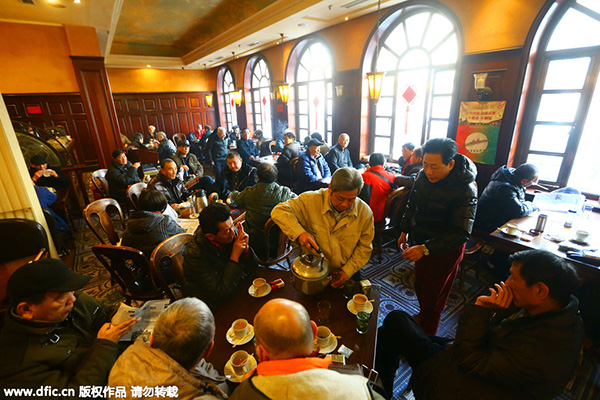 |
|
Call it a tea house or a coffee shop, the first floor of Deda cafe and restaurant has become a home from home for some of Shanghai's senior residents to reminisce about their bourgeois lifestyles in past decades. [Photo/IC] |
Less than 1 kilometer away, a zigzagging line has been waiting outside Deda, an unpretentious cafe and restaurant, for the first sip of what many patrons describe as "the cheapest and most fragrant coffee in town".
People have been lining up there every morning for 50 years. For elderly locals, it is a cherished symbol of Shanghai's bourgeois aspirations.
Before 10 am, freshly brewed coffee sells for 10 yuan ($1.6) a cup, marking a 60 percent discount from the regular price. A latte at Starbucks would cost more than three times as much.
But those who line up each morning come rain or snow, say it is not just the price but the flavor-tinged with nostalgia and decades of memories-that makes it so special.
"It's a daily routine. I get up, brush my teeth, wash my face and come here for my second gargle-with coffee," said Shen Pingyuan, 72, as he stood in line amid a fierce downpour with some friends.
"If we don't see him by eight o'clock, we know he's in hospital," quipped a younger man nearby.
"Who knows who will be going to their graves first?" Shen said, showing no decline in mental dexterity or humor despite his advanced years as he offered the man a cigarette.
At 7:30am the doors of the two-floor cafe eased open and the crowd filtered into its cramped space, which features a dozen or so tables.
No one was pushing or shoving. Many seemed to have their favorite, time-honored seats. Most were well-dressed.
The majority of this Chinese coffee club are over 60, the age of retirement for men in China. They grew up in an age when coffee was enjoyed by the city's middle class, before the "cultural revolution" (1966-76) came along and swept up such bourgeois talismans in a maelstrom of anti-Western purging.
Before this, the city was hailed as "the Paris of the East". Shanghai was carved into different concessions from the middle of the 19th century.
It attracted adventurers from the United States, the United Kingdom and France, many of whom brought their Western ways with them from coffee to balls, church weddings and fashions.
Another Shanghai local, 76-year-old Zhu Hangjun, recalled drinking more coffee than tea until the former was banned. His father worked as a clerk at a foreign bank.
